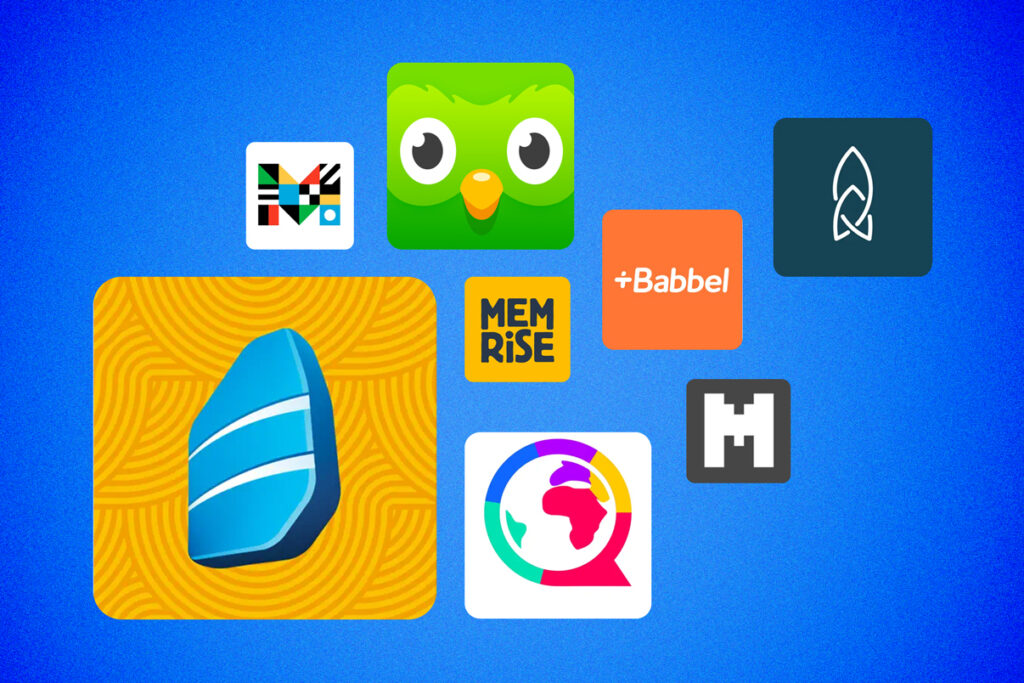Overview of Rocket Languages and Rosetta Stone

In the realm of digital language learning, Rocket Languages vs Rosetta Stone emerge as prominent contenders, each offering unique methodologies to language acquisition. Rocket Languages, known for its blend of audio lessons and cultural insights, provides learners with a structured path that includes ample English explanations to guide users through their language journey.
On the other hand, Rosetta Stone has long been celebrated for its immersive approach, eschewing translations in favor of visual and auditory cues that mimic the natural language acquisition process.
Both platforms have evolved to incorporate advanced speech recognition technology and interactive features, yet they maintain distinct educational philosophies that cater to different learning preferences.
As we delve into the specifics of language options, teaching methods, and user experiences, it’s clear that choosing between Rocket Languages and Rosetta Stone is not just a matter of price or popularity. It’s about aligning with a system that resonates with your learning style, whether that means engaging with the moderator-led discussions of Rocket Languages or embracing the intuitive, immersive environment of Rosetta Stone.
With both platforms offering a range of subscription options and boasting their own sets of pros and cons, the subsequent sections will provide a deeper comparison to help you make an informed decision on which language learning tool best suits your educational needs.
Language options and availability
Rocket Languages
When it comes to language options and availability, Rocket Languages offers a focused selection that caters to learners interested in some of the most widely spoken languages worldwide.
With courses in 13 languages, including Spanish, French, Italian, German, Japanese, and Mandarin, Rocket Languages provides comprehensive learning materials that are accessible on both computers and mobile devices.
The platform is particularly accommodating for languages with non-Latin scripts, offering specialized writing sections with video lessons to help users master different alphabets.
For those seeking to learn American Sign Language (ASL), Rocket Languages stands out as one of the few online language learning platforms to include it in their repertoire.
Rosetta Stone
Expanding the horizon of language learning, Rosetta Stone offers an impressive array of 25 languages, from commonly-studied ones like Spanish, French, and German to less commonly offered languages such as Greek, Hebrew, and Polish.
This breadth of options makes Rosetta Stone a clear choice for those seeking variety and the opportunity to study less widely-taught languages.
The platform’s strength lies in its visual learning approach, incorporating rich imagery and interactive content that caters to visual learners. With a commitment to immersive learning, Rosetta Stone encourages learners to deduce meaning and context from pictures, fostering a more natural language acquisition experience.
Teaching methods and approach

Rocket Languages
Rocket Languages distinguishes itself with a teaching methodology that emphasizes audio lessons as the cornerstone of language learning. This approach is designed to simulate real-life conversations, with an English-speaking moderator guiding learners through dialogues in the target language.
The interactive audio lessons, which form the core of Rocket Languages’ curriculum, encourage active participation by having learners respond to native speakers within the context of actual conversations. This immersive experience is complemented by Rocket Reinforcement activities, which integrate various language skills such as listening, speaking, reading, and writing.
These activities, including Flashcards and the Write It! exercises, ensure a well-rounded mastery of the language.

Additionally, Rocket Languages offers Language and Culture lessons that are presented in a textbook-style format, focusing on essential grammar and cultural insights.
These lessons are followed by reinforcement activities to solidify the learning material. Despite the audio-centric approach, Rocket Languages does not neglect the importance of reading and writing, providing tools like Sort It! and Draw It! for languages with unique scripts.
The program’s structure, which includes both interactive audio and language & culture lessons, caters to a variety of learning preferences and ensures a comprehensive understanding of the language being studied.
Rosetta Stone
With Rosetta Stone, learners are plunged into a visually-driven educational environment that eschews direct translations and explicit instructions in English. This immersive method is designed to mimic the natural language acquisition process, where users must rely on visual cues and intuition to grasp new vocabulary and sentence structures.
The program’s core lessons, typically lasting around 30 minutes, are complemented by a series of supplemental drills that reinforce pronunciation, listening, grammar, reading, and writing skills. The TruAccent speech engine is a notable feature, enabling learners to compare their pronunciation with that of native speakers, thus enhancing their speaking abilities.

Furthermore, Rosetta Stone’s approach is characterized by its heavy reliance on images, with lessons and drills resembling interactive flashcards. This method encourages learners to match words and phrases with corresponding images, such as pairing “el niño lee” with a picture of a boy reading, to solidify their understanding.
As learners progress, they encounter increasingly complex sentences, advancing their language skills systematically. The program’s design, which focuses on intuitive learning and minimal use of English, aims to provide a brief but intense daily immersion experience.
Interactive features and user experience

Rocket Languages
Rocket Languages enhances the user experience by gamifying the language learning process, making it both engaging and rewarding. The platform’s interactive features include a variety of Rocket Reinforcement activities that cater to different learning styles, such as FlashCards, Hear It! Say It!, and Write It!, all designed to reinforce language skills in a dynamic way.
The voice recording software is a standout tool, allowing users to record their speech and compare it to native speaker pronunciation, which is crucial for developing accurate speaking skills.
These interactive elements are seamlessly integrated into the lessons, providing a user-friendly experience that encourages consistent practice and improvement.
Moreover, Rocket Languages motivates learners through a points system and a leaderboard, fostering a competitive spirit that drives progress. The inclusion of certification tests based on the CEFR framework adds a tangible goal for users, with the opportunity to earn a Certificate of Achievement upon successful completion.
This combination of interactive exercises, gamification, and recognition of milestones contributes to a comprehensive and enjoyable user experience.
Rosetta Stone
Enhancing the interactive learning experience, Rosetta Stone offers a suite of features designed to enrich language proficiency.
The “Phrasebook” is a handy tool for mastering everyday expressions, while the “Audio Companion” facilitates on-the-go practice, allowing learners to download audio content and refine their pronunciation anytime, anywhere.
For those seeking to delve deeper into language nuances, the “Stories” feature provides a collection of short literary works for advanced reading practice, and the “Seek & Speak” AR game introduces a fun, interactive way to build vocabulary using real-world objects.
Additionally, Rosetta Stone’s “Live” tutoring sessions connect learners with native-speaking professionals, offering personalized guidance and conversation practice.
On the user experience front, Rosetta Stone’s digital platform and mobile app stand out with their sleek design and intuitive navigation, making language learning an aesthetically pleasing and user-friendly endeavor. The bite-sized core lessons, equipped with the TruAccent speech engine, ensure that learners can effectively work on their pronunciation and language skills in manageable increments.
This focus on visual learning and interactive exercises, combined with the platform’s engaging layout, positions Rosetta Stone as a strong contender for those who prefer a visually-oriented learning approach. For a closer look at the user experience provided by Rosetta Stone, further details are available here.
Pricing and subscription options

Rocket Languages
When it comes to pricing, Rocket Languages offers a straightforward approach with lifetime access to their courses. Unlike subscription-based models, Rocket Languages provides a one-time purchase option, ensuring that learners can access the material indefinitely without recurring fees.
The cost for Level 1 starts at $149.95, while the comprehensive package of Levels 1-3 is priced at $449.85. However, Rocket Languages frequently offers significant discounts, often reducing the price by at least 50%, making their courses more accessible and competitively priced.
For those who commit to the full three-level course, a six-month payment plan is available, easing the upfront investment.
Additionally, Rocket Languages includes a 60-day money-back guarantee, giving users peace of mind and the confidence to invest in their language learning journey.
It’s worth noting that the number of free Survival Kits provided corresponds with the level of the course purchased.
These kits, which are designed to help learners quickly master essential phrases and vocabulary, are included for free with the purchase of all three levels, but can also be bought separately if only one or two levels are chosen. This flexibility allows learners to tailor their investment to their specific learning needs and goals.
Rosetta Stone
Turning to Rosetta Stone, the platform presents a variety of subscription options to accommodate different learning timelines and budgets. Users can choose from a 3-month plan at approximately $36, a 12-month subscription for around $179, or opt for the lifetime access priced at $199, which includes all available languages.
It’s important to highlight that Rosetta Stone frequently runs promotions, making these plans even more affordable. For instance, the lifetime package often sees discounts that significantly lower the cost, sometimes to as little as $180.
To ensure customer satisfaction, Rosetta Stone also offers a 30-day money-back guarantee and a free trial period, allowing learners to test the service before fully committing.
Moreover, Rosetta Stone’s pricing structure is designed to be straightforward, with the monthly cost remaining consistent across different subscription lengths. This consistency simplifies the decision-making process for learners, as they can select the plan that best suits their learning pace without worrying about varying monthly rates.
The platform’s commitment to affordability and flexibility is evident in its payment plans for purchases over $99, ensuring that language education is accessible to a wider audience.
Customer reviews and satisfaction
Rocket Languages
Customer satisfaction with Rocket Languages is often highlighted by the program’s engaging audio lessons and the gamification of the learning process. Users appreciate the interactive nature of the lessons, which involve responding to native speakers in realistic conversations, as opposed to the more isolated word repetition found in some other programs.
This active involvement in dialogues, coupled with the motivational tools such as points, leaderboards, and certification tests, has been praised for keeping learners engaged and committed to their language studies. The speech recognition technology, powered by Google’s web speech API, also receives commendation for its accuracy and helpful feedback, contributing to a positive user experience.
Furthermore, the comprehensive grammar and culture explanations provided by Rocket Languages are seen as a significant advantage over competitors that adopt a more intuitive approach to grammar instruction. These structured lessons, which are designed to clarify complex language points, have been well-received by users seeking a deeper understanding of the language they are learning.
The availability of lifetime access to course materials with a one-time payment is another aspect that garners appreciation, as it eliminates the pressure of recurring fees and allows learners to progress at their own pace. Overall, Rocket Languages’ commitment to a user-friendly and effective learning experience is reflected in the positive feedback from its customer base.
Rosetta Stone
When it comes to customer reviews and satisfaction, Rosetta Stone garners acclaim for its immersive learning experience, which is particularly beneficial for visual learners. The program’s use of vivid imagery and interactive exercises helps users to form strong associations between words and pictures, enhancing memory retention.
Additionally, the TruAccent speech engine is frequently mentioned in reviews as a standout feature, allowing learners to fine-tune their pronunciation by comparing it to that of native speakers. This focus on accurate speech production is a key factor in the positive reception of Rosetta Stone among users who prioritize speaking skills.
Despite its strengths, some users have noted that the lessons can sometimes feel repetitive, which may affect motivation levels over time. However, the availability of live classes and the plethora of extra resources, such as phrasebooks and videos, provide a comprehensive learning package that many find worth the investment.
The platform’s multiple subscription options and the money-back guarantee further contribute to customer satisfaction by offering flexibility and a risk-free trial of the service.
Here’s a brief comparison table between Rocket Languages and Rosetta Stone:
| Aspect | Rocket Languages | Rosetta Stone |
|---|---|---|
| Teaching Approach | Conversational, interactive, and practical. | Immersive, image-based, and context-driven. |
| Language Options | Multiple languages available. | Extensive language offerings. |
| Course Structure | Structured lessons with audio and exercises. | Dynamic lessons with image-word associations. |
| Focus on Pronunciation | Emphasis on pronunciation and speaking. | Pronunciation is integrated into the lessons. |
| Grammar Instruction | Grammar is explained in lessons. | Grammar is acquired through immersion. |
| Interactive Exercises | Variety of interactive exercises and quizzes. | Interactive activities for reinforcement. |
| Cultural Insights | Limited cultural insights. | Provides cultural context within lessons. |
| User-Friendly Interface | Intuitive and user-friendly platform. | Simple and easy-to-navigate interface. |
| Mobile App Availability | Available on iOS and Android. | Mobile apps for learning on the go. |
| Offline Access | Allows offline access to lessons. | Requires an internet connection for most features. |
| Progress Tracking | Progress tracking and assessments. | Continuous progress tracking and feedback. |
| Cost | Typically a one-time purchase or subscription fee. | Subscription-based model with monthly or yearly plans. |
| Free Trial | Offers a free trial for users. | May have limited free access or trial periods. |
Conclusion

In the final analysis, choosing between Rocket Languages and Rosetta Stone hinges on individual learning preferences and goals. Rocket Languages shines with its structured grammar lessons, cultural insights, and interactive audio sessions, making it a strong contender for those who prefer a comprehensive and engaging approach to language learning.
Its one-time payment for lifetime access is also a compelling feature for learners looking for a long-term investment without ongoing costs.
On the other hand, Rosetta Stone’s immersive method, with its strong focus on visual learning and pronunciation, is ideal for learners who thrive on intuitive learning and want to develop conversational skills quickly.
Both platforms have carved out their niches in the language learning market, with Rocket Languages winning favor for its exercise diversity and in-depth instruction, while Rosetta Stone remains a popular choice for its user-friendly interface and lifetime access to all languages.
Ultimately, the decision may come down to whether a learner is seeking a more traditional, grammar-focused study plan or an immersive, intuitive experience.
Whichever path you choose, both Rocket Languages and Rosetta Stone offer robust programs that can significantly advance your language proficiency.
Sources:
- https://www.alllanguageresources.com/rocket-languages-vs-rosetta-stone/
- https://guide2fluency.com/comparisons/rocket-languages-vs-rosetta-stone/
- https://www.fluentu.com/blog/rosetta-stone-vs-rocket-languages/
- https://testprepinsight.com/comparisons/rocket-languages-vs-rosetta-stone/
- https://www.quora.com/How-did-you-best-learn-a-foreign-language-Rosetta-Stone-Babbel-Rocket-Pimsleur-or-another
FAQ
-
How is Rocket Languages compared to Rosetta Stone?
From a high level, that’s how the two companies compare. Both companies’ lessons are about an hour long from end-to-end, but they’re very different in format. The Rosetta Stone lessons are really image heavy and focus more on learning intuitively, while the Rocket lessons are all about immersion through audio lessons.
-
Can you become fluent with Rocket Languages?
In short, Rocket Languages is a great component of an overall language learning program, but there doesn’t seem to be enough material or resources to take learners to total fluency or even a highly proficient point. In conclusion, Rocket Languages offers a lot of benefits for language learners.
-
Is Rosetta Stone still the best language program?
Rosetta Stone remains the best premium software for building a foundation in a foreign language. It’s excellent for beginners, and it has a ton of additional content for more advanced learners, too. PCMag editors select and review products independently.
-
Is Rocket Spanish worth it?
Yes, our team found Rocket to be extremely good for Spanish, especially if you’re going to be traveling or moving to Latin America. Of all the Spanish courses we’ve reviewed, it ranks right up near the top in terms of effectiveness.
Originally posted 2023-12-04 04:43:43.



